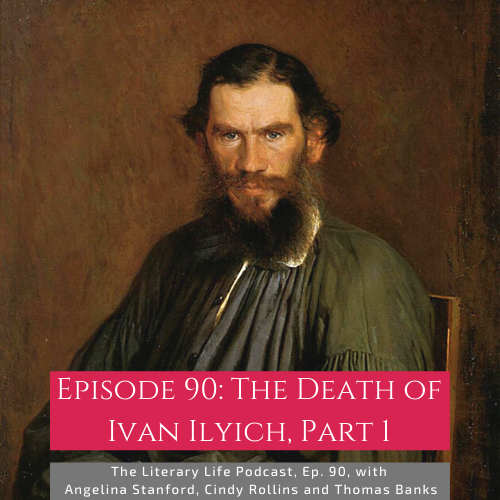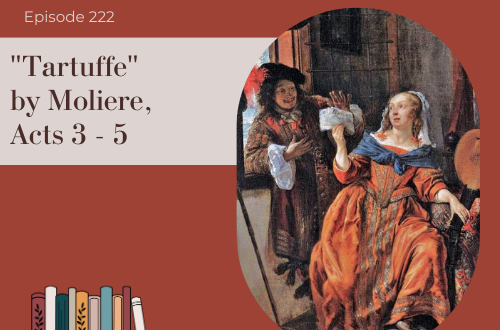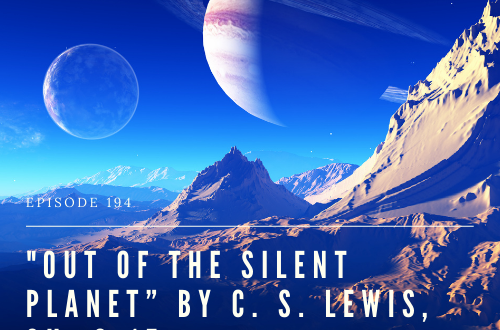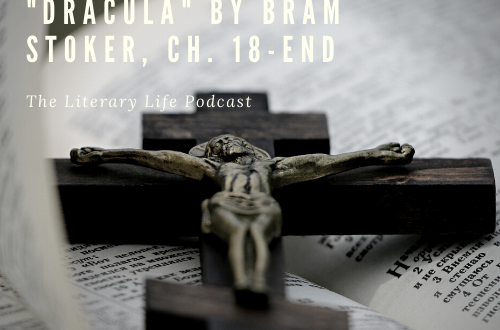
Episode 90: “The Death of Ivan Ilyich” Part 1
On this week’s episode of The Literary Life Podcast, Angelina Stanford, Cindy Rollins and Thomas Banks delve into part one of a two-part discussion of Leo Tolstoy’s The Death of Ivan Ilyich. Our hosts kick things off talking about their background with Russian literature, and Thomas gives some biographical information on Tolstoy. They also talk about the concept of the “holy fool.” Some ideas discussed in this episode include the characters’ responses to death, the mask of respectability, and the problem of discontent.
Cindy is hosting a new summer discipleship course for moms this year, so head over to morningtimeformoms.com for more info and to sign up! Thomas and Angelina also have some great summer classes coming up, and you can check those out at houseofhumaneletters.com.
Listen to The Literary Life:
Commonplace Quotes:
Arrogance is a weed that ever grows in a dunghill.
Owen Feltham
To enhance the wonder, see
William Wordsworth, from “Prelude”
How arch his notices, how nice his sense
Of the ridiculous; . . . . he can read
The inside of the earth, and spell the stars;
He knows the policies of foreign lands;
Can string you names of districts, cities, towns,
The whole world over, tight as beads of dew
Upon a gossamer thread; he sifts, he weighs;
All things are put to question; he must live
Knowing that he grows wiser every day,
Or else not live at all, and seeing too
Each little drop of wisdom as it falls
Into the dimpling cistern of his heart:
For this unnatural growth the trainer blame,
Pity the tree…
Meanwhile old grandame earth is grieved to find
The playthings, which her love designed for him,
Unthought of: in their woodland beds the flowers
Weep, and the river sides are all forlorn.
Oh! give us once again the wishing-cap
Of Fortunatus, and the invisible coat
Of Jack the Giant-killer, Robin Hood,
And Sabra in the forest with St George!
The child, whose love is here, at least, doth reap
One precious gain, that he forgets himself.
[Fairy stories] never seek to criticize or moralize, to protest or plead or persuade; and if they have an emotional impact on the reader, as the greatest of them to, that is not intrinsic to the stories. They would indeed only weaken that impact in direct proportion as soon as they set out to achieve it. They move by not seeking to move; almost, it seems, by seeking not to move. The fairy-story that succeeds is in fact not a work of fiction at all; . . . It is a transcription of a view of life into terms of highly simplified symbols; and when it succeeds in its literary purpose, it leaves us with a deep indefinable feeling of truth.
C. M. Woodhouse, on Animal Farm, The Times Literary Supplement, 1954
Growing Old
by Matthew Arnold
What is it to grow old?
Is it to lose the glory of the form,
The luster of the eye?
Is it for beauty to forego her wreath?
—Yes, but not this alone.
Is it to feel our strength—
Not our bloom only, but our strength—decay?
Is it to feel each limb
Grow stiffer, every function less exact,
Each nerve more loosely strung?
Yes, this, and more; but not
Ah, ’tis not what in youth we dreamed ’twould be!
’Tis not to have our life
Mellowed and softened as with sunset glow,
A golden day’s decline.
’Tis not to see the world
As from a height, with rapt prophetic eyes,
And heart profoundly stirred;
And weep, and feel the fullness of the past,
The years that are no more.
It is to spend long days
And not once feel that we were ever young;
It is to add, immured
In the hot prison of the present, month
To month with weary pain.
It is to suffer this,
And feel but half, and feebly, what we feel.
Deep in our hidden heart
Festers the dull remembrance of a change,
But no emotion—none.
It is—last stage of all—
When we are frozen up within, and quite
The phantom of ourselves,
To hear the world applaud the hollow ghost
Which blamed the living man.
Book List:
The Death of Ivan Ilyich by Leo Tolstoy
Resolves: Divine, Political, and Moral by Owen Feltham
War and Peace by Leo Tolstoy
Anna Karenina by Leo Tolstoy
Crime and Punishment by Fyodor Dostoyevsky
Fathers and Sons by Ivan Turgenev
Papa Panov’s Special Day by Mig Holder
The Giagantic Turnip by Aleksei Tolstoy
Koshka’s Tales: Stories from Russia by James Mayhew
The Idiot by Fyodor Dostoyevsky
Sense and Sensibility by Jane Austen
Jane Austen at Home by Lucy Worsley
How Much Land Does a Man Need and Other Stories by Leo Tolstoy
Support The Literary Life:
Become a patron of The Literary Life podcast as part of the “Friends and Fellows Community” on Patreon, and get some amazing bonus content! Thanks for your support!
Connect with Us:
You can find Angelina and Thomas at HouseofHumaneLetters.com, on Instagram @angelinastanford, and on Facebook at https://www.facebook.com/ANGStanford/
Find Cindy at morningtimeformoms.com, on Instagram @cindyordoamoris and on Facebook at https://www.facebook.com/cindyrollins.net/. Check out Cindy’s own Patreon page also!
Follow The Literary Life on Instagram, and jump into our private Facebook group, The Literary Life Discussion Group, and let’s get the book talk going! http://bit.ly/literarylifeFB
Subscribe to The Lit Life:









One Comment
Angie
My first Tolstoy book was his memoir, A Confession. I highly recommend! I love the podcast and I’m enjoying all the past episodes. Thank you LIT life. 🤗❤️